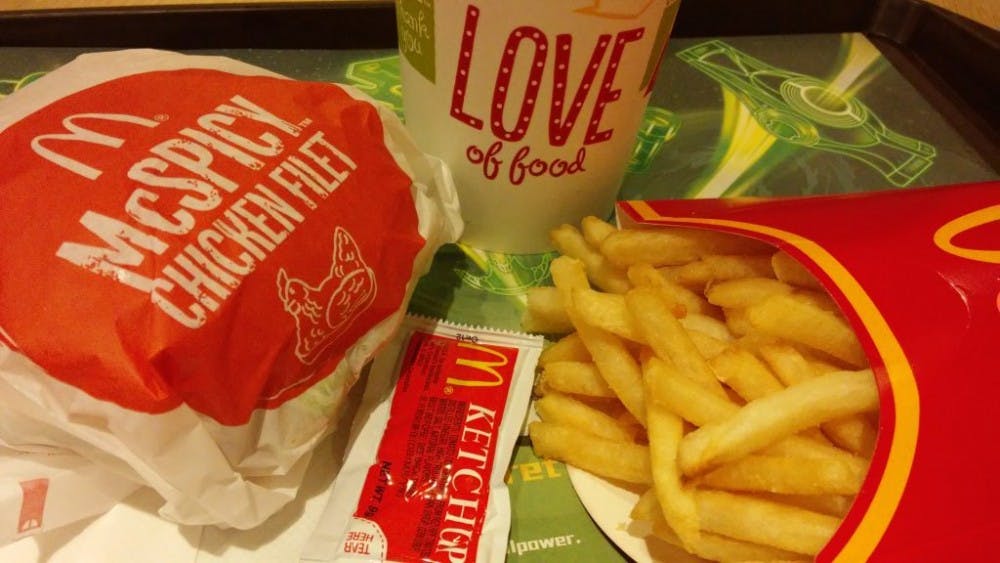
The casual refusals to consume each dinner’s protein had continued to build up that summer. As a 16 year old unable to hide anything from my mother for longer than a week, I finally decided to reveal my dietary mission.
“Well, just don’t try to convert me,” my mother responded, claiming that her Italian-American upbringing on meatballs and sausage made her virtually impervious to vegetarianism. During my next two years living at home, the pan on the left stove burner — away from the rest of the meal — contained my alternative vegetarian dinners.
My argument at the dinner table that night wasn’t without evidence. I attributed my sudden lifestyle revolution to Mr. Murphy’s summer reading assignment: Fast Food Nation, the 2001 investigation by journalist Eric Schlosser.
Through its 10 chapters, including “Why the Fries Taste Good” and “The Most Dangerous Job,” Fast Food Nation explores the people, places and past behind America’s industrialized food system.
“I’m interested in [fast food] both as a commodity and as a metaphor,” Schlosser writes in his introduction. “A nation’s diet can be more revealing than its art or literature.”
I named the book as my motivation but attending a large high school and facing constant comparison to my twin sister, I was already looking for something that could solidify my individuality. With the nationwide health craze only just having started in 2012, vegetarianism provided me with that unique identity.
Schlosser’s investigation on child-targeted marketing also hooked me. Less than 10 years before reading Fast Food Nation, I had been one of the children playing in the McDonald’s ball pit and sitting next to Ronald McDonald on a Walmart bench while my mother waited in line to purchase a Happy Meal.
In middle school, my field hockey team ate at a fast food restaurant after every away game. I remember looking forward to purchasing a burger and milkshake with money from my parents more than playing the game itself. In a journalistic tone free from judgment, Schlosser revealed to me my already prolonged dependence on fast food.
Making my own personal sacrifice, I also felt like I was taking a step, if only indirectly, to boycott a system that oppressed the other Americans that Schlosser interviewed.
I wanted to help Regina Jones, a high school dropout and Taco Bell employee who worked 70 to 80 hours a week but was paid for only 40 and Kenny Dobbins, a Monfort slaughterhouse employee for almost 16 years who was fired despite sustaining countless work-related injuries like severely herniated disks, chemical burns, a broken leg, a shattered ankle and a massive heart attack.
Still continuing a meat-free diet today, I feel like a chorus of health-conscious crusaders now amplify Schlosser’s once lone voice. From documentaries like Morgan Spurlock’s Super Size Me (2004) to Robert Kenner’s Food, Inc. (2008), a muckraking spirit has been channeled toward the American food industry.
Fast Food Nation today feels less like a groundbreaking infiltration and more like a document useful for pulling up historic statistics. Reading Schlosser’s report again that states, “the Golden Arches are now more widely recognized than the Christian cross,” my original frustration has transformed into a light laugh at such absurdity.
In his afterword, Schlosser himself is hopeful, predicting a departure from our reliance on industrialized food.
“This new century may bring an impatience with conformity,” Schlosser writes, “a refusal to be kept in the dark, less greed, more compassion, less speed, more common sense, a sense of humor about brand essences and loyalties, a view of food as more than just fuel.”
Although I still maintain a healthy skepticism for rebranding and continued food negligence, including McDonalds’ introduction of McCafé and Chipotle’s recent E. coli outbreak, Schlosser’s fast food nation feels like an empire in decline.
We have a long way to go, but food education is on the rise. Four the past eight years, even our country’s first lady has championed healthy eating and exercise as a national priority.
Even though many reciprocal conversations and recipe swapping with fellow vegetarians has diminished my sense of uniqueness, I’m more satisfied by an enhanced sense of progress.





